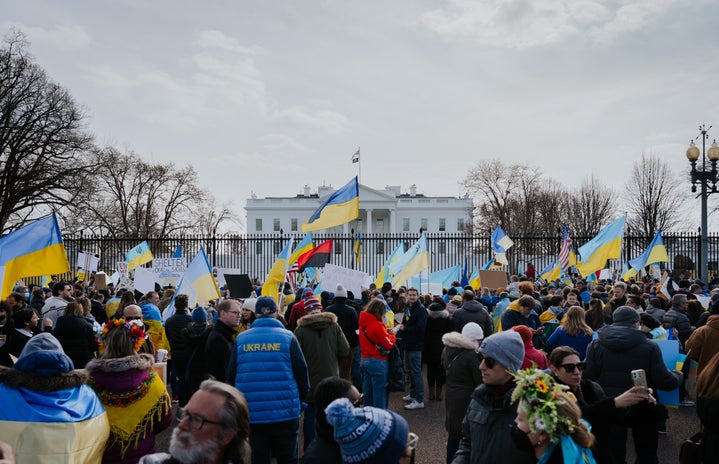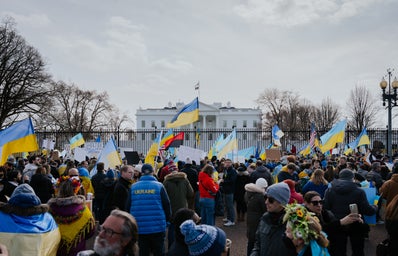On February 24th of 2022, Ukraine had its territory occupied by Russian troops after weeks of threats from President Vladimir Putin. Since then, the international mainstream media has been focused on Eastern Europe, carefully following the unfolding of this conflict, which has been going on since 2014. Now, the war has endured for over a month, and it still is the main issue heavily talked about on the news everywhere.
The world’s reaction and concern to this ongoing war are expected, of course, considering the mass destruction, the death of thousands of civilians, and its impact on a global scale. This isn’t, however, the only conflict happening right now that is destroying countries and killing innocent lives. So, why is the Russian-Ukrainian War getting all of the world’s attention?
Impartiality
When we talk about journalism, one of the main things that come to mind is impartiality, which is considered a basic principle in journalistic ethics. It is important for journalists to stay on neutral grounds, but is it always possible?
Since the very first Russian invasion of Ukrainian territory, the media has shown without hesitation high levels of empathy and sympathy for the attacked country and its population. The objective point of view usually used, and demanded, by Western journalism is hardly seen in the news reports of this conflict, in which we can identify many terms that appeal to the reader’s emotions.
The stories presented on screens and papers refer to Russia’s “special operation” with the words “invasion”, “attack”, “unprovoked aggression”, and “assault”. The media has clearly called out Vladimir Putin for “deliberately targeting civilians” and “shelling residential areas”. Furthermore, the Ukrainians’ quick reaction against their enemy’s military was praised, the news highlighted the country’s troops and volunteers who decided to stay to defend their nation, constantly using the term “resistance”.
On the other hand, this language is not used and is actually denied, by the Western media when covering conflicts in the Middle East and in Africa, for example. According to the journalist Dr. Zahera Harb, Leader of International Journalism Studies Cluster at City who has extensively covered the Middle Eastern media, in an article for the news channel Al Jazeera, she was never allowed to describe the conflicts with these words. “When I was reporting for BBC Arabic during Israel’s occupation of southern Lebanon, for example, I was told never to refer to the Israeli military as the “occupying force” for the sake of impartiality.”, she wrote.
Moreover, in 2014, English journalist and television presenter Jon Snow published a video on the Channel 4 news website reporting the Israel-Palestine conflict, in which he shows how hundreds of innocent children get severely injured or even killed, calling for the Israeli military to end this violence. The video went viral on social media and, while many congratulated and thanked him for exposing the war’s consequences, lots of journalists and analysts criticized Snow for allegedly breaking British journalism’s number one rule of impartiality.
Socioeconomic influence: global impact
Apart from the neutrality issue, the extensive media coverage of the war in Ukraine was also something questioned. Even though there’s no doubt that the news isn’t able to report every issue in the world, the unequal amount of reports of this conflict, when compared to the reports of other wars in different regions, was criticized on social media.
One of the reasons that could explain Western’s major reporting of this conflict is the fact that the countries involved are extremely significant in the world’s socioeconomic status. The US News & World Report’s ranking of 2021 Most Influential Countries classified Russia as the 4th most influential nation, behind the United States, the United Kingdom, and China. It is no surprise that any affair related to these countries would be of great interest to every newspaper around the world.
Therefore, considering Russia’s power, the conflict has a global impact. “The international post World War II order is being upended. In addition to the humanitarian cataclysm unfolding, there is a strong possibility that it could bleed into a conflict with our NATO allies and draw the United States into a conflict with a Russia that has used unconventional weapons in the past and is threatening to use nuclear weapons now.”, stated Janine Zacharia, a longtime journalist who is the Carlos Kelly McClatchy Lecturer in the Department of Communication, in an interview for Stanford University.
Racism and xenophobia
Even though the socioeconomic reasons could explain the amount of attention from the West towards Ukraine’s war, social media has been flooded with people accusing the media of racism and xenophobia. Many called out the double standards and the bias, due to some comments made by journalists and political figures on live television.
“This isn’t a place, with all due respect, like Iraq or Afghanistan that has seen conflict raging for decades. This is a relatively civilized, relatively European – I have to choose those words carefully, too – the city where you wouldn’t expect that, or hope that it’s going to happen” declared CBS News senior correspondent in Kyiv, Charlie D’Agata.
On France’s most-watched cable news channel, BFM TV, journalist Phillipe Corb said that this isn’t about Syrians fleeing the bombing of the country’s regime backed by Vladimir Putin, they are talking about “Europeans leaving in cars that look like ours to save their lives.”
Furthermore, in an interview for BBC, David Sakvarelidze, Ukraine’s former deputy general prosecutor, expressed that this subject is very emotional for him because he sees “European people with blonde hair and blue eyes being killed every day with Putin’s missiles and his helicopters and his rockets”. A member of the French National Assembly, Jean-Louis Bourlanges, told a TV channel that Ukrainian refugees are “an immigration of great quality, intellectuals, one that we will be able to take advantage of”. Declarations like these were immediately met with criticism and anger online, with the public pointing out how dehumanizing and discriminatory these statements are.
On Twitter, lots of users voiced their indignation and frustration towards these episodes.
“But people with ‘blue eyes and blonde hair’ dropping bombs over the Middle East and Africa is OK.”, wrote another. In addition, some celebrities also criticized Western media coverage of the Russia-Ukraine War. The South-African comedian and presenter Trevor Noah called out the racism in news reporting in one of his episodes of The Daily Show. “I was shocked to see how many reporters around the world seem to think that it’s more of a tragedy when white people have to flee their countries”, he said.
There’s no doubt that the media should cover the war in Ukraine, after all, it is a tragedy on a global scale. However, every humanitarian crisis ought to be reported as well, with similar attention, considering that thousands of innocent lives are also in prejudice in other conflicts happening around the world. May the motives for the West’s unequal attention be socioeconomic or racism, or both, let’s hope to see a change in the future.
The article above was written by Luana Watanabe and edited by Marina Fornazieri. Liked this type of content? Check out Her Campus at Cásper Líbero for more!


